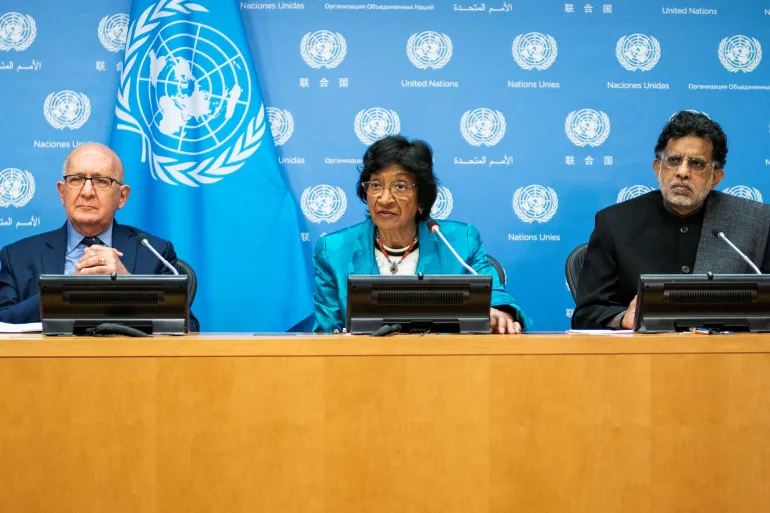Hearings on human rights violations in Israel and Palestine by the UN committee are over.

The committee of investigation questioned witnesses, including the departed Al Jazeera writer Shireen Abu Akleh’s family and coworkers.
As part of its duty to look into human rights abuses in Israel and the occupied Palestinian areas, an impartial committee of investigation with the United Nations has conducted a second round of public meetings.
The five-day Geneva proceedings, which came to a close on Friday, were primarily concerned with the dwindling role of civil society and the harassment of human rights advocates, campaigners, attorneys, and media.
Shireen Abu Akleh’s coworkers and relations were among those who testified before the Commission of Inquiry on the Occupied Palestinian Territory, including East Jerusalem, and Israel.
On May 11, 2022, Israeli troops shot and murdered the experienced TV correspondent, who was 51, as she covered a military operation in the West Bank settlement of Jenin.
Walid Omary, the head of Al Jazeera Arabic’s Jerusalem bureau, testified to the commission that “independent investigations have concluded that the gunfire aimed at Abu Akleh and other reporters came from Israeli soldiers and that the journalists were deliberately targeted despite wearing distinctive press signs on their vests.”
He declared that it was a war crime when media were purposefully attacked during hostilities.
One of the three members of the committee of investigation, Miloon Kothari, told Al Jazeera that the testimony given during the sessions was “very disturbing.”
Kothari told Al Jazeera that “there has been an escalation in the closure of the civil society space by the Israeli authorities, the Palestinian authorities, and the de facto authority in Gaza.”
We’re gathering all of this data, which will be delivered to the Human Rights Council in June of this year.
The 11-day Israeli assault of the confined Gaza Strip in May 2021, which resulted in at least 250 Palestinian deaths, led to the establishment of the Commission of Inquiry on the Occupied Palestinian Territory, including East Jerusalem, and Israel. Rocket strikes from Gaza killed at least 13 persons in Israel.
The Human Rights Council decided to “urgently establish an ongoing, independent, international commission of inquiry” to look into abuses in the occupied Palestinian territory as well as – for the first time – in Israel, starting on April 13, 2021, through a resolution that was approved in a session on May 27, 2021.
A further request made in the motion was for the commission of inquiry to “investigate all underlying root causes of recurrent tensions, instability, and protracted conflict, including systematic discrimination and repression based on national, ethnic, racial, or religious identity.”
The committee has an indefinite authority to submit yearly reports to the General Assembly and the Human Rights Council beginning in June 2022 and September 2022, respectively.
From November 7 to November 11, 2022, it conducted its first round of open proceedings, concentrating on Abu Akleh’s murder as well as the closing orders and “terrorism” designations placed on several Palestinian human rights organizations. Israel had previously referred to the proceedings as “sham trials” and asserted that the investigation had anti-Israel bias.
In a prior statement, the committee expressed sorrow for “Israel’s lack of cooperation, as well as its refusal to permit entry into Israel and to permit access to the Occupied Palestinian Territory.”
The proof gathered by the committee would be made accessible “to all judicial bodies,” according to Kothari, a specialist in international law who worked as the UN special envoy on appropriate accommodation with the Human Rights Council. The International Court of Justice (ICJ) received a report from it last year, and it was anticipating a ruling on “the legality of occupation,” he continued.
The ICJ was also tasked with defining the obligations of third states, according to Kothari.
The siege has been recognized as the “root cause” of the human rights abuses, according to Navi Pillay, head of the committee, who made this statement on Tuesday. She continued, saying that it was “clearly permanent” as opposed to being only transitory, and that the talks were “just a pretense.”
Palestinian human rights advocate Issa Amro stated during his testimony that the goal of his work and that of others like him was to “show the world what is happening.”
He declared, “Palestinians deserve full rights; we deserve justice and equality and we will not give up our fundamental human rights.”
“We won’t give up,” he continued, “but we need the support and protection of the international community.”






